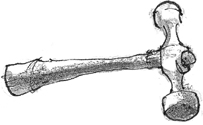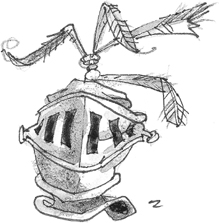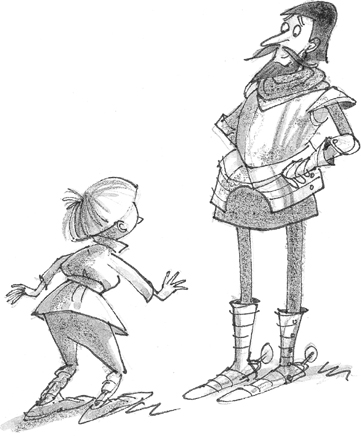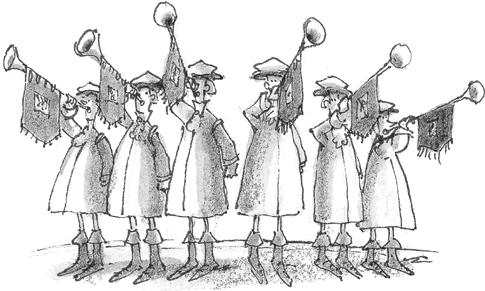
Sir Gallawood

“Ooooohhhh,” the knight in the battered armor moaned.
“Ooooohhhh,” he moaned again, adding another “Ooooohhhh” almost straightaway.
Roland stepped closer as the moaning knight lay there waiting for Mr. Wright to return with the right device to hit him on the head.
“What happened, sir?” Roland asked the knight. Roland had forgotten what his father had told him: that a young boy should never speak to an adult unless spoken to. He certainly shouldn’t start a conversation with a nobleman.
“Ooooohhhh. I was in a joust, a friendly joust at the Queen’s Festival,” said the knight from beneath his squashed visor. “And—ooooohhhh—I was hit in the chest by my opponent’s lance.”
The knight had a low, unhappy voice that sounded like it was coming out of a long tunnel.
“And as I fell off my horse I hit the barrier and then got kicked by my own steed, which was all in a panic. Ooooohhhh.

“My visor spun around and I could no longer see out. For the first time in my career I had to yield. I had to give up.
“Ooooohhhh, and if that wasn’t bad enough, I couldn’t get my head out of my squashed helmet. Even my own blacksmith couldn’t get it out.”
Mr. Wright came over with a large flat-headed hammer. “This should prove suitable, sir.”
Roland’s father had such a deep voice that the visor on the knight’s helmet rattled when he spoke. Mr. Wright lifted his arm high and started pounding the helmet back into shape.
Bang. “Ouch.”
Thump. “Ooooow.”
Thud. “Yeeeeps.”
Wallop. “Ooooohhhh.”
With a final sigh, which sounded exactly halfway between an “aaaaaahh” and an eeeeerrrrr, the knight jumped to his feet. He lifted the reshaped helmet off his head and stuck his fingers into his ears.
“Sorry about the yelling, my good man,” he finally said, looking down at Mr. Wright, who was much shorter. “It’s not really the knightly thing to do. But it’s a bit loud inside a metal helmet when someone is hitting it with a hammer. My ears are chiming like church bells. But I’m most appreciative, my good man, thank you.”

Roland’s father didn’t say anything. He never said too much, and when he did, he tended to use many of the big words he picked up from the knights who bought his armor. Some of these words were very substantial, extended and elongated. Yet Roland and Shelby always seemed to know what he meant.
This time Mr. Wright just nodded at the knight, then walked away to put his hammer back in the toolbox.
The knight’s head was horribly bruised and he had blood on his cheeks. But Roland saw his long black hair and pointy beard and knew straightaway who the knight was.
“Sir Gallawood,” Roland yelled out. He had again forgotten he had no right to speak to a knight. “I’m Roland Wright—Oliver’s son—and I’m so happy to meet you. You are my favorite knight. I think you are the best fighter of them all.”
“Oh, why is that?” Sir Gallawood asked as he rubbed his swollen ears.
Roland was so excited he was talking at twice his normal speed.
“You are the best fighter, not just because you live at the castle near our village. No, no, no. It’s because of the way you move quickly and tire out the other knights. You are so much fitter than they are and stronger, too. And I like the way you keep trying, no matter what happens.”

“I don’t think I was the best fighter today,” Sir Gallawood said softly. “But I’m very pleased to meet you too, young man. I’ve heard that your father is the most skillful armorer in the land.”
Sir Gallawood rubbed his face, then twisted his fingers in his ears.
“I’m lucky I wasn’t killed today, so I won’t be using any more of the armor passed on from my father. I always thought that if I was a good enough fighter, the type of armor didn’t matter. But now I will order a set of Wright plate armor.”
Roland beamed with pride. He was sure he could feel Nudge in his top pocket wriggling with pride too.
“I think my father is the greatest armorer in the land too,” Roland said. “It’s not just that he makes plate armor. He says metal with scrolls and frills might look fancy, but it isn’t as strong.”
Roland talked even more quickly. “Metal with scrolls and frills isn’t as light either. Father says you have to build armor for strength, not style. And it has to bend easily at the joints so that you can move quickly. And the weight has to be spread evenly.
“Knights wearing my father’s armor can do somersaults and run almost as fast as a man in normal clothes.”
“I see,” Sir Gallawood said to Roland with a smile. “Oliver Wright will never have trouble selling his armor with a son like you, now will he?”
As he said the words “now will he?” Sir Gallawood let out a loud laugh. He then gave Roland a friendly punch on the shoulder. The power of Sir Gallawood’s huge fist—even in play—knocked Roland two steps sideward.
At that exact moment, a group of six men in uniform appeared in the main doorway. They wore long, bright red coats and tall black boots. They had big floppy hats on their heads and frilly white scarves around their necks. They stood in two rows and played a short tune with their long trumpets.
Everyone in the forge put down their tools and walked toward the door. For once the factory was silent, except for the crackle and roar of the smith’s furnace.
The workers at the forge had never seen anything quite like it. Not in this small village, anyway. Colorful clothes needed rare and costly dyes; large leather boots took months to make. Yet here were six men dressed in the finest uniforms the workers had ever seen, each carrying an expensive brass instrument.

A seventh man suddenly walked between the trumpeters. He was dressed in an even longer and fancier red coat. His flat black hat was even bigger and was topped with a plume made of white silk.
He started to talk in a voice as loud as thunder.
“As a herald of the royal castle …,” he bellowed.

Roland could feel Nudge push himself deeply into the corner of his shirt pocket as the man spoke. Roland ran his finger gently over Nudge’s back and whispered to him, “Don’t worry, he says he is from the royal castle. I think it’s good news. I think I was right, something special is happening.”
“I hereby announce,” the herald continued, “that His Majesty’s officer-of-arms is coming with an important message directly from the King for Mr. Oliver Wright. He will arrive shortly.”